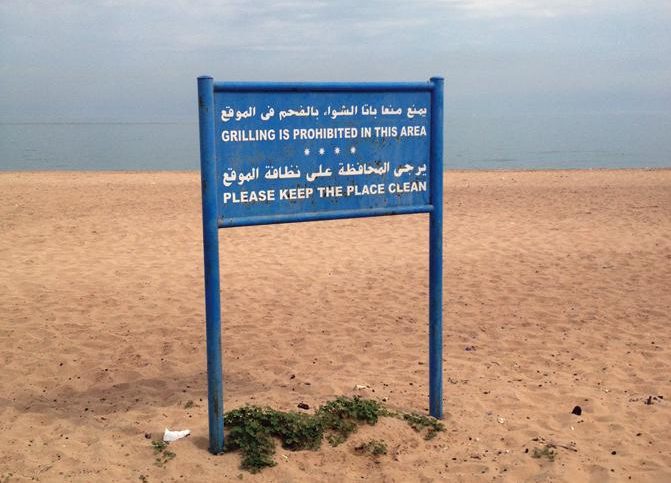The sea lies calm, a deep sapphire blue with no trace of the dull grey it was over the weekend. Its waves traverse from afar to stretch out onto the sandy shore, dissipating into nothingness upon reaching it. But one notices another sea along with the Arabian Gulf—albeit not as appealing—that of garbage, the remnants of revelries of the night before. It disappears in the course of the morning as the municipality cleaners dispose of it, only to reappear a few hours later as though to taunt the beach that it can harbour no hope of staying clean because no one cares enough to keep it so.
I’ve seen some peculiar objects in the sea along with the usual plastic and paper: an upturned shopping trolley, a cooler, water guns… a friend has spotted an abandoned television set, a sheep carcass and half a yellow tanker washed ashore. I’d love to know the story behind the TV.
Littering is a despicable habit. Somehow, we’ve developed an attitude that projects “it’s cool not to care”. News flash buddy, you’re a fool not to care! People, regardless of nationality, education or level of income seem to think it doesn’t matter if they throw their junk anywhere but here’s a thought; even if you have an army of servants at your beck and call, would you toss litter onto the floor of your home? Most wouldn’t. Then why treat the beaches any differently?
If you get up early enough on a Friday morning, you’re bound to see trash all along the coast. The waves at high tide wash up even more onto the shore. Nothing is spared, not the beach, trees, promenade, grassy lawns or the benches. The tragedy is that the apathetic amongst us even dump leftover food and packaging upon the rocks, where they get lodged into crevices and are thus impossibly out of reach of a cleaner’s latex glove, eventually becoming breeding grounds for pests. Even if there are dustbins in the vicinity, and empty ones at that, the beaches will be sprawling with bottles, cardboard boxes, take away fast food containers, plastic and paper bags and more. When in season, wildflowers creep out of the rocks but it is nearly impossible to click a picture of them without including the surrounding waste.
Think about the consequences of a person’s inability to clean up after themselves upon the environment. We share the earth with millions of organisms; it’s estimated that three-fourths of these haven’t even been discovered yet. Thousands of these are at risk because of our ignorance and indifference. Destruction of animal habitats and the near extinction of species may be brought about by poaching, deforestation, hunting for sport, industrialization, agriculture etc. Many of us are not responsible for these activities at an individual level, so let’s look at what we can be held accountable for. A million sea birds and hundreds of thousands of marine animals die globally every year because of either getting entangled in plastic waste or from ingesting it. We’re not leaving much of a world for the generations to come.
How can we combat littering? Complaining about people’s habits isn’t going to get one anywhere. Lead by example. Admonish friends and family that toss their rubbish out on the street. If you catch them in the act, make them pick up their trash and chuck it in a bin (which in all likeliness won’t be too far off). I’ve managed to get two friends and a colleague to change their habits the same way. Keep a bag in the car for your garbage and toss it out altogether (into a trashcan!) at the end of the day. Make sure you clear up after a picnic at the beach; don’t leave an unsightly mess behind. Most importantly, teach children in your family or those you may come across that it is wrong to litter, for they are the future.
Whether it’s for a walk, run, bike ride, picnic, barbecue or even photography, the beaches are amongst the few places of solace in Kuwait where you can be at one with nature. It isn’t pleasant to have their beauty marred by tons of garbage thrown about carelessly. Keep in mind that these are public spaces you share not just with 3.5 million other people, but over 250 species of migratory birds and hundreds of species of diverse marine life. There seems to be no reason why an educated, affluent and well-travelled populace would treat public beaches which can be pristine and beautiful as their personal landfill. This lack of civic sense frankly, makes no sense.











